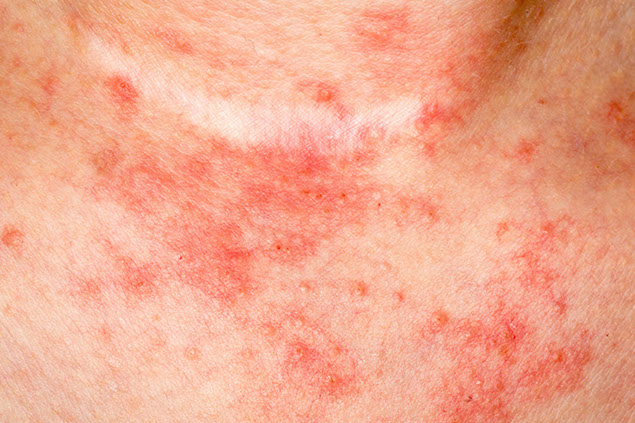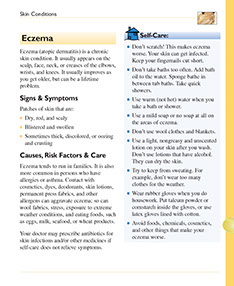CONDITIONS
SYMPTOM CHECKER
Male
Female
Child
Arm, Hand & Shoulder Concerns
Legs & Feet Concerns
Dental & Mouth Concerns
Ear & Nose
Eye Conditions
Head Conditions
Arm, Hand & Shoulder Concerns
Legs & Feet Concerns
Front
Back
Arm, Hand & Shoulder Concerns
Dental & Mouth Concerns
Ear & Nose
Eye Conditions
Head Conditions
Arm, Hand & Shoulder Concerns
Dental & Mouth Concerns
Ear & Nose
Eye Conditions
Head Conditions
Front
Back
Arm, Hand & Shoulder Concerns
Neck Links
Head & Neck Concerns
Arm, Hand & Shoulder Concerns
Neck Links
Head & Neck Concerns
Front
Back
Online Clinic
Wise Healthcare
Eczema
Eczema (atopic dermatitis) is a chronic skin condition. It usually appears on the scalp, face, neck, or creases of the elbows, wrists, and knees. It usually improves as you get older, but can be a lifetime problem.
Poison Ivy, Oak & Sumac
Signs & Symptoms
Patches of skin that are:
Causes, Risk Factors & Care
Eczema tends to run in families. It is also more common in persons who have allergies or asthma. Contact with cosmetics, dyes, deodorants, skin lotions, permanent press fabrics, and other allergens can aggravate eczema; so can wool fabrics, stress, exposure to extreme weather conditions, and eating foods, such as eggs, milk, seafood, or wheat products.
Your doctor may prescribe antibiotics for skin infections and/or other medicines if self-care does not relieve symptoms.
Self-Care
• Don’t scratch! This makes eczema worse. Your skin can get infected. Keep your fingernails cut short.
• Don’t take baths too often. Add bath oil to the water. Sponge bathe in between tub baths. Take quick showers.
• Use warm (not hot) water when you take a bath or shower.
• Use a mild soap or no soap at all on the areas of eczema.
• Don’t use wool clothes and blankets.
• Use a light, nongreasy and unscented lotion on your skin after you wash. Don’t use lotions that have alcohol. They can dry the skin.
• Try to keep from sweating. For example, don’t wear too many clothes for the weather.
• Wear rubber gloves when you do housework. Put talcum powder or cornstarch inside the gloves, or use latex gloves lined with cotton.
• Avoid foods, chemicals, cosmetics, and other things that make your eczema worse.
When to Seek Medical Care
Contact Doctor When:
• You have signs of an infection: Fever; and/or large amount of weeping or crusting skin areas.
• Your skin is red, you can’t stop scratching, and this keeps you from sleeping.
• You get no relief from self-care.
This website is not meant to substitute for expert medical advice or treatment. Follow your doctor’s or health care provider’s advice if it differs from what is given in this guide.
The American Institute for Preventive Medicine (AIPM) is not responsible for the availability or content of external sites, nor does AIPM endorse them. Also, it is the responsibility of the user to examine the copyright and licensing restrictions of external pages and to secure all necessary permission.
The content on this website is proprietary. You may not modify, copy, reproduce, republish, upload, post, transmit, or distribute, in any manner, the material on the website without the written permission of AIPM.
2021 © American Institute for Preventive Medicine - All Rights Reserved. Disclaimer | www.HealthyLife.com
















































